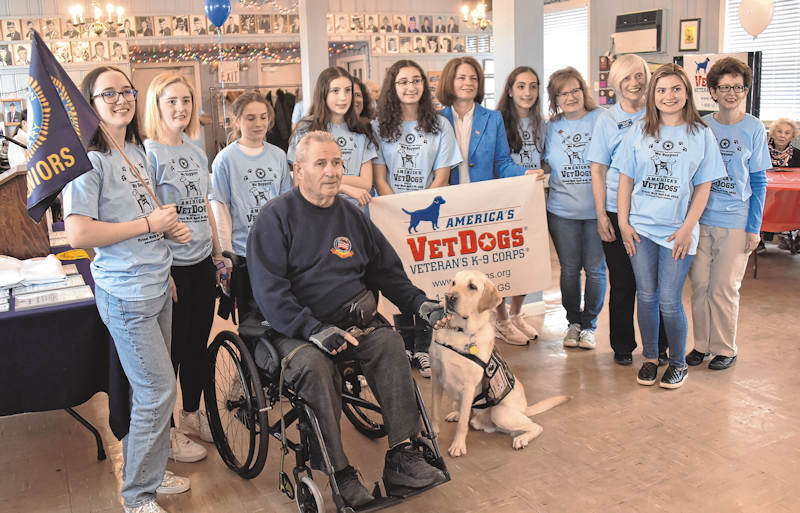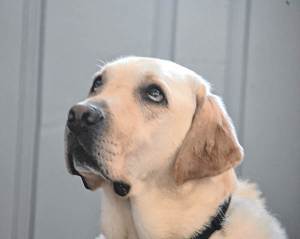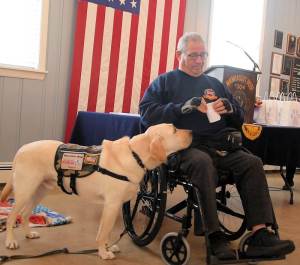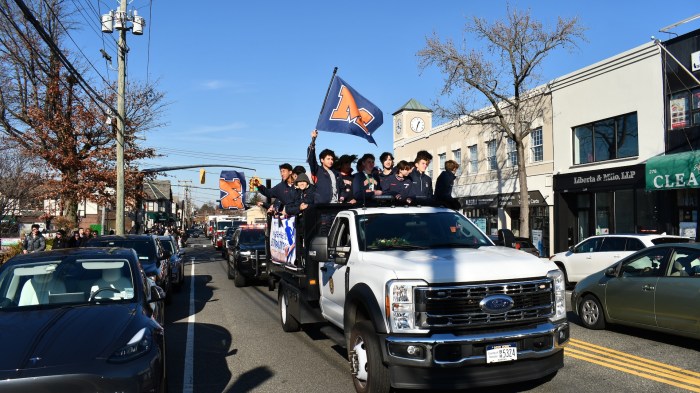
Veteran:‘This Dog Saved My Life’
Andrew Booth never wanted a service dog. Did not think he needed one. Denied that he had problems—other people had problems. He came to change his way of thinking.
The Levittown resident, 72, was the guest of honor at the Manhasset American Legion Post 304 recently to talk about America’s VetDogs, the organization that aided him through his struggles as a disabled vet.
“I was going down a slippery road till I got a hold of this dog,” Booth admitted, with “Chucky” patiently standing next to his wheelchair. “This dog saved my life.”
He added, “My wife [Joyce] is happy—sometimes (laughter). He became like my right hand man. Wherever I go this dog goes.”

Booth, a retired Marine, former county commander of the American Legion and president of the United Veterans Organization in Garden City, made like a stand-up comic at times.
“My wife says to all her friends, ‘[The dog] does not listen to me. Just like my husband,’ ” Booth said to laughter
The Golden Retriever is 4, and has been with the veteran a little more than two years.
Booth’s talk was part of a kickoff for a virtual walk fundraiser organized by the American Legion Auxiliary Unit 304 Juniors (members under 18). Auxiliary President Patricia O’Brien presided over the gathering, which, until she was felled by COVID, was supposed to feature state Auxiliary President Mary E. Farley,
The department (state) head, according to O’Brien, was the daughter of a Navy veteran and retained the memory of her father telling her a humorous story of how he and his fellow sailors smuggled a dog aboard the ship. The pooch eventually won over the skeptical captain and was allowed to stay,
At the state convention where Farley told the story, O’Brien went on, the president stated, “I understand through my dad the importance that animals have in veterans and military lives.”
As a consequence, Farley chose America’s VetDogs, based in Smithtown and created in 2003, as this year’s project for all units in the state to support.

The organization’s mission statement, per its website: “To help those who have served our country honorably live with dignity and independence. The service dog programs of America’s VetDogs were created to provide enhanced mobility and renewed independence to United States veterans, active-duty service members, and first responders with disabilities, allowing them to once again live with pride and self-reliance. Not only does a service dog provide support with daily activities, it provides the motivation to tackle everyday challenges.”
The non-profit has stringent standards to match a dog with a veteran. Booth went through the screening process and met the qualifications. He spent two weeks at the Smithtown facility getting trained in how to interact with his new companion.
“They try to fit the dog to the veteran,” Booth said. “Not every veteran has the same problems as what I have or someone else might have.”
Booth repeated the figure on America’s VetDogs website, that its costs more than $50,000 to breed, train, and place the dog with a veteran. The overwhelming majority are Golden Retrievers.
Observed O’Brien, “The training is very specific to the veteran and all services are provided at no cost through the generosity of individuals, organizations, and businesses.”
The first night at Smithtown, he related, he was in his room and there came a knock and the door opened and “Chucky” flew in and sprang up to lick his face. Booth was quickly won over.
“The dog is training you, because the dog knows the commands already,” Booth observed. “It takes a good year to teach the dog all the commands.”
Show And Tell
Booth demonstrated several commands that his dog followed, saying that, “He does everything by signals.”
He dropped his cell phone on the floor and commanded the dog to pick it up and at the end he gave him a treat and joked that “it was like children, you have to give them a treat to get them to do anything.”
There are perks to having a service dog, who can travel at no cost on airlines, even in first class if there are seats. “Chucky” loves to fly, his owner said, and added that airlines now distinguish between service animals and “emotional support animals” (ESA).

As of January 2021, the U.S. Department of Transportation no longer required airlines to accommodate the latter in the cabin. Previously, airlines were mandated by the DOT to allow boarding by owners and their ESA with proper documentation from a licensed mental health professional.
Booth said that many people claim to have service dogs to try to take advantage of perks, but they are imposters.
“Service dogs carry an ID like a driver’s license, with their photo on it,” he affirmed. “If someone tells you it’s a service dog tell them you want to see their ID. And it matches the one that I have in my wallet.”
Being that he was taken to MacArthur Airport as a pup, airplane noise does not bother his dog.
Booth said he lives on a block where “no one knows the difference between the 3rd of July and the 4th of July (laughter). They just set fireworks around that time. [“Chucky”} just sits there and watches them.”
Again, one of the dog’s early handlers lived on a similar noisy block that celebrated Independence Day.
“Chucky” also isn’t bothered by the sound of loud motorcycle mufflers; the same handler belonged to a motorcycle riding club and brought the dog to meetings.
To test this, Booth took his dog to a local motorcycle dealer and asked several people there to race their engines. “Chucky” was unfazed.
Booth listed some of his dog’s “powers”:
“He does not bark for any reason,” the veteran said. “He does not go to the bathroom on grass, only on concrete and he’ll hold it till he gets back home.”
Unusual for a canine, “Chucky” knows the command for walking backwards—a necessary skill for negotiating, say, tight restaurant aisles.
“Nobody asked me how he got this name,” Booth told the assembled, then added, “You do not have the pleasure of naming the dog. [That] usually goes to the corporation that puts up money to train the dog and gets naming rights.”
Booth admitted that the name brought to mind the murderous doll of the notorious movies, drawing laughter.
As part of his treatment Booth goes to the VA medical facility in Northport twice a month. On one of those trips he drops “Chucky” off at America’s VetDogs, where the dog is groomed and bathed. He loves playing with other dogs and lying on a clutch of towels, his owner related.
Booth often takes the dog to Jones Beach and draws attention. He demonstrates commands to people and they want to know if he could train their dog to do that.
“I say, ‘Why would I want to do that? I don’t even teach my own dog,’” Booth said to laughter.
He also educates people that “Chucky” should not be petted because he is “working,” and emphasized, “He is not a pet.”
Booth said that occasionally he can’t sleep, and when “Chucky” realizes this, he flouts the directive against jumping on the bed to comfort him. Once his owner is back asleep, the dog goes back to his usual spot next to the bed.
Booth told the assembled that “Chucky” sleeps in an orthopedic-type bed.
“Nothing but the best,” he said dryly. “I don’t even have one of those, but he (pointing to his dog) has one (laughter).”
Notes & Quotes: According to O’Brien, local sponsors for the virtual walk included ALC Steel Corporation, DLJ Real Estate Capital Partners LLC, Forchelli Deegan Terrana LLP and Mainspring. Several representatives were on hand to accept certificates of appreciation.
Town of North Hempstead Supervisor Jen DeSena was among the attendees. Also on hand was Nassau County American Legion Auxiliary President Kathleen Murphy, who praised, “I just want to say congratulations to all the junior members of Post 304, because you are the most active, best juniors in the county.”
O’Brien connected with Martin Clark Jr., away at college, to acknowledge his designing the tee-shirts. They included a Q-code so people could connect with America’s VetDogs.
Martin Clark Sr. was on hand to represent his Eagle Scout son.
For more information visit www.vetdogs.org.





























